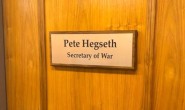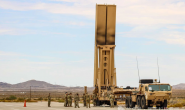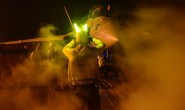4、CNA海军陆战队部
专注领域:后勤和基础设施;人力资源和培训;作战和计划;航空;实战开发和集成(combat development and integration);项目和资源。
CNA海军陆战队部对海军陆战队主管部门至关重要的问题进行广泛研究,研究过程动用了CNA总部的分析师,以及在海军陆战队司令部、海军陆战队太平洋司令部、海洋特种作战司令部、三个海军远征部队以及海军航空武器和战术中队(Marine Aviation Weapons and Tactics Squadron One,MAWTS-1)的研究人员。CNA分析人员也负责协助海军陆战队各级司令部和其他组织,包括海军陆战队作战实验室、海军陆战队系统司令部、以及海军陆战队预备役司令部等。
5、CNA作战评估组(OEG)
专注领域:战略研究;战术分析;作战分析;作战测试;准备与培训。
CNA作战评估组对海军、海军陆战队和联合司令部的决策者所面临的一系列战略、战术挑战进行持续的实地研究。通过实地研究项目,OEG会指派分析人员进行2-3年的实地研究,为世界范围内的作战司令部呈送实时分析报告。这些司令部包括航母战斗群、海军陆战队远征部队、美国中央司令部和美国太平洋司令部。
附英文介绍:
CNA’s Center for Naval Analyses is a federally funded research and development center (FFRDC) for the Navy and the Marine Corps. It also provides research and analysis services to other military and government agencies to help improve the efficiency and effectiveness of U.S. national defense efforts.
CNA’s History
CNA traces its roots to World War II when, in the early 1940’s, the Navy turned to a small group of MIT scientists for help in responding to the German U-boat threat. These scientists pioneered the concept of operations research by insisting on deploying with Navy forces in order to directly observe operational challenges and collect the data needed for meaningful analyses. Their groundbreaking work not only resulted in anti-submarine warfare barrier equations that set the standard for future operations research methods, it also helped establish operations research and analysis as a distinct field, and style, of study. Over its more than 60 year history, CNA’s work has been defined by multi-disciplinary, field-based “real world” operations research and analysis that combines observation of people, decisions, and processes by rigorously trained analysts to help decision makers understand the consequences of possible actions and to implement the best possible solutions.
CNA’s SIPRNET
In February 2008, CNA’s Center for Naval Analyses launched its SIPRNET website — www.cna.navy.smil.mil — the SIPRNET a classified version of the Internet, used by the Department of Defense and Department of State.
CNA Advanced Technology & Systems Analysis (ASTA)
Areas of focus: aviation systems and technology; science and technology; information technology and operations; force structure and employment; maritime search and undersea warfare; expeditionary systems and support.
Research conducted by CNA Advanced Technology & Systems Analysis focuses on analyses of ways to improve future material readiness for the Navy, Marine Corps, and other components of the Department of Defense. Analysts conduct assessments of alternative technical and systems approaches designed to address emerging gaps in the capabilities of U.S. forces, and assess the cost, performance, and risks of various material solutions to address these gaps. ATSA analysts develop a thorough understanding of sponsors’ objectives and operating environments – including sea, land, air, space, and cyberspace – and of the performance characteristics of supporting technologies and systems. Analysts also serve as a link between scientists and engineers in the research and development communities and operators in the Fleet and Marine Forces.
CNA China Studies
Areas of focus: defense and security affairs; foreign policy and transformational issues; leadership and domestic politics; institutional and organizational analyses; internal security; social change, and governance.
CNA China Studies is provides the American public, government officials, and business leaders with high-level analyses of important issues in U.S.-China relations, emerging trends within China, and its changing role in world affairs. Analyses are conducted by researchers who have lived, worked, or studied in China, Hong Kong, or Taiwan and for whom Chinese is a working research language, and publications and programs are designed to provide the insights and context need for leaders make informed judgments and develop sound plans.
CNA Marine Corps Division
Areas of focus: logistics and infrastructure; manpower and training; operations and plans; aviation; combat development and integration; programs and resources.
CNA’s Marine Corps Program conducts analyses on a wide range of issues critical to the Marine Corps leadership, using CNA Headquarters-based analysts as well as analysts serving in the field at Marine Forces Command, Marine Forces Pacific, Marine Special Operations Command, the three Marine Expeditionary Forces, and Marine Aviation Weapons and Tactics Squadron One (MAWTS-1). Analysts are also assigned to support the Deputy Commandants and their staffs and other Marine Corps organizations including the Marine Corps Warfighting Lab, Marine Corps Systems Command, and the Commander, Marine Forces Reserve.
CNA Operations Evaluation Group (OEG)
Areas of focus: strategic analysis; tactical analysis; operational analysis; operational testing; readiness and training
CNA Operations Evaluation Group conducts ongoing, field-based research focused on a host of strategic, operational, and tactical challenges facing decision-makers at Navy, Marine Corps, and Joint commands. Through its Field Program, OEG sends analysts on two- to three-year deployments to provide real-time analytic support to operational commands around the world (including aircraft carrier strike groups, Marine expeditionary forces, the U.S. Central Command, and the U.S. Pacific Command).
CNA Operations & Tactics Analysis (OTA)
Areas of focus: maritime domain awareness; combat system interoperability; fleet systems; command-and-control structures: precision strike warfare; consequence management; counter-IED and counter-mining; aircrew training; engagement and humanitarian assistance operations; and training for operators at the tactical and operational levels of war
CNA Operations & Tactics Analysis focuses primarily on evaluating current military operations and capabilities – from major combat, to smaller-scale directed strikes, to peacetime engagement missions with partner nations to build capacity or provide humanitarian assistance. OTA also evaluates the effectiveness of new tactics and systems employed to counter such threats as mines, improvised explosive devices (IEDs), chemical/biological/radiation weapons, GPS jammers, and cruise/ballistic missiles.
CNA Resource Analysis
Areas of focus: infrastructure and readiness; manpower management; materials management; environment, climate change, and energy; facilities and real estate; acquisition and cost management; budget and execution management; metrics and competitive sourcing; cost and schedule analysis; workforce, education, and training
CNA Resource Analysis provides analytical services to help develop, evaluate, and implement policies, practices, and programs that make people, budgets, and assets more effective and efficient. All of the division’s analyses are aimed at resolving sponsors’ problems through empirical research, or through modeling and simulation.
CNA Strategic Studies
Areas of focus: political-military issues; irregular warfare; in-theater analysis of Afghanistan and Iraq operations; strategic concepts and futures planning; leadership analysis; U.S. military engagement and shaping activities; Middle East and Latin America security issues; East Asia security strategies; the Afghanistan/Pakistan nexus; Project Iran; North Africa Piracy and the Gulf of Guinea.
CNA Strategic Studies is CNA’s focal point for the research and analysis of regional political-military and policy issues, and U.S. strategy and force assessment planning. Its work is characterized by a heavy use of primary sources of information, the operational and policy expertise of its analysts—which includes foreign language skills and experience gained by living, working, or studying abroad—and by recommendations that focus on understanding the “why” behind today’s headlines and identifying and analyzing “the issue after next.”
CNA Military Advisory Board
In 2006 CNA convened a Military Advisory Board (MAB) of retired three- and four-star flag and general officers from the Army, Navy, Air Force and Marine Corps to assess the impact of global climate change on key matters of national security and lay the groundwork for mounting responses to the threats found.
In April 2007 CNA released the MAB’s report, National Security and the Threat of Climate Change, that articulates the concept of climate change acting as a “threat multiplier” for instability in some of the most volatile regions of the world and identifies key challenges that must be planned for now if they are to be met effectively in the future.
In May 2009 CNA’s MAB released its second report, Powering America’s Defense: Energy and the Risks to National Security. This report (which builds on the first report’s finding that “climate change, national security, and energy dependence are a related set of global challenges”) explores the impact of America’s energy choices on our national security policies, and considers: the security risks inherent in our current energy posture; the energy choices America can make to enhance national security; and the role the Department of Defense can play in the nation’s approach to energy security and climate change.
The MAB’s third report, Powering America’s Economy: Energy Innovation at the Crossroads of National Security Challenges, released in July of 2010, explores the growing challenges presented by the links that tie America’s energy posture to its economy and national security. It looks at the potential opportunities that could result from the transition to a clean energy technology-based economy and the key role that the Department of Defense (DOD) can play to support innovation and commercialization of clean, low-carbon energy, thereby directly contributing to America’s future economic competitiveness and bolstering national security.
Reference:
[1] http://en.wikipedia.org/wiki/Center_for_Naval_Analyses
[2] http://www.cna.org
转载请注明:北纬40° » 海军的兰德公司:美国海军分析中心



